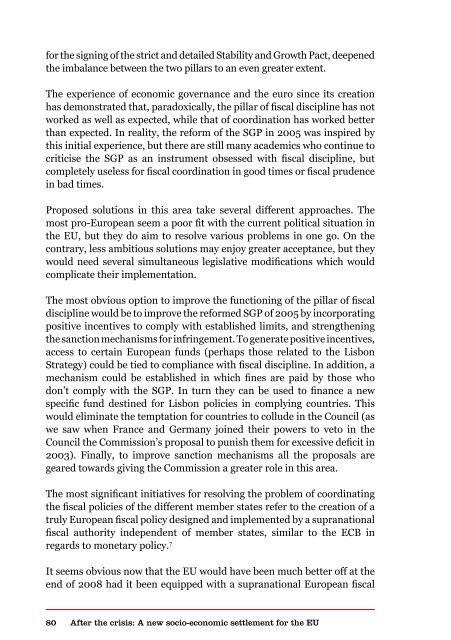Authors Iain Begg | Gabriel Glöckler | Anke Hassel ... - The Europaeum
Authors Iain Begg | Gabriel Glöckler | Anke Hassel ... - The Europaeum
Authors Iain Begg | Gabriel Glöckler | Anke Hassel ... - The Europaeum
You also want an ePaper? Increase the reach of your titles
YUMPU automatically turns print PDFs into web optimized ePapers that Google loves.
for the signing of the strict and detailed Stability and Growth Pact, deepened<br />
the imbalance between the two pillars to an even greater extent.<br />
<strong>The</strong> experience of economic governance and the euro since its creation<br />
has demonstrated that, paradoxically, the pillar of fiscal discipline has not<br />
worked as well as expected, while that of coordination has worked better<br />
than expected. In reality, the reform of the SGP in 2005 was inspired by<br />
this initial experience, but there are still many academics who continue to<br />
criticise the SGP as an instrument obsessed with fiscal discipline, but<br />
completely useless for fiscal coordination in good times or fiscal prudence<br />
in bad times.<br />
Proposed solutions in this area take several different approaches. <strong>The</strong><br />
most pro-European seem a poor fit with the current political situation in<br />
the EU, but they do aim to resolve various problems in one go. On the<br />
contrary, less ambitious solutions may enjoy greater acceptance, but they<br />
would need several simultaneous legislative modifications which would<br />
complicate their implementation.<br />
<strong>The</strong> most obvious option to improve the functioning of the pillar of fiscal<br />
discipline would be to improve the reformed SGP of 2005 by incorporating<br />
positive incentives to comply with established limits, and strengthening<br />
the sanction mechanisms for infringement. To generate positive incentives,<br />
access to certain European funds (perhaps those related to the Lisbon<br />
Strategy) could be tied to compliance with fiscal discipline. In addition, a<br />
mechanism could be established in which fines are paid by those who<br />
don’t comply with the SGP. In turn they can be used to finance a new<br />
specific fund destined for Lisbon policies in complying countries. This<br />
would eliminate the temptation for countries to collude in the Council (as<br />
we saw when France and Germany joined their powers to veto in the<br />
Council the Commission’s proposal to punish them for excessive deficit in<br />
2003). Finally, to improve sanction mechanisms all the proposals are<br />
geared towards giving the Commission a greater role in this area.<br />
<strong>The</strong> most significant initiatives for resolving the problem of coordinating<br />
the fiscal policies of the different member states refer to the creation of a<br />
truly European fiscal policy designed and implemented by a supranational<br />
fiscal authority independent of member states, similar to the ECB in<br />
regards to monetary policy. 7<br />
It seems obvious now that the EU would have been much better off at the<br />
end of 2008 had it been equipped with a supranational European fiscal<br />
80<br />
After the crisis: A new socio-economic settlement for the EU

















